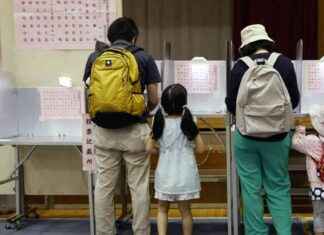This African-American child, bathing cap pressed down on his head, managed to overcome this trauma to participate in swimming lessons provided free of charge by Swim Up, an association in the American capital, to students from a school in a disadvantaged neighborhood .
Of nine learner swimmers this October afternoon, eight are African-American, a group particularly at risk: in the United States, the drowning rate for black children aged 5 to 14 is about 3 times higher than that of white children, according to health authorities.
In question, in the first place, the fact that 64% of black children know little or no swimming, against 40% of whites, indicates the American swimming federation.
In August 2010, a tragedy brutally illustrated the urgency of the situation: during a barbecue with friends near the Red River, in Shreveport, Louisiana, DeKendrix Warner, a black teenager who had entered the river, lose footing.
He does not know how to swim. Neither did his six friends and cousins who cooled off with him in the current and immediately tried to rescue him. No more, either, than the adults who helplessly watch the scene from the shore.
DeKendrix survives, saved by a passerby, but the other six teenagers, aged 13 to 18, all drown.
– Swimming pools closed –
In the United States, there is no federal obligation to teach swimming at school, but if so many black children do not learn to swim, it is above all for historical reasons linked to the slavery and racial inequality, say activists and historians.
“Slaves could escape bondage by knowing how to swim,” notes Ebony Rosemond, director of Black Kids Swim, an organization promoting swimming among young African-Americans.
“So it was in the interests of those who possessed humans to make sure they didn’t have that skill, or were too scared to jump into the water.”
After the abolition of slavery in 1865, white supremacist movements terrorized African-Americans, “lynching them, brutalizing them and hanging their bodies near bodies of water”, continues Ebony Rosemond.
With the civil rights movement comes desegregation. Cities are being ordered by the courts to open their swimming pools to black people. But many, especially in the South, will choose to close them instead, says University of Montana historian Jeff Wiltse, author of A Social History of Swimming Pools in America.
These racial discriminations “have strongly restricted the access of black Americans” to the pools and “swimming has therefore never integrated their recreational and sports culture, and has not been transmitted from generation to generation”, he summarizes. in a 2014 article.
– “It’s cold!” –
Today, many initiatives are trying to correct the situation, like Swim Up.
Mary Bergstrom, its co-founder, is distributing bathing caps and shorts to the children this afternoon. “Get in the water,” she recommends. One throws himself into it and jumps: “It’s cold!”
To tame the waves, the children first learn to float on their backs, then kick their feet to move forward, arms outstretched, guided by the 36-year-old lawyer, a former high-level swimmer.
Aiden, who has come a long way, is very comfortable. One of his distracted buddies forgets to breathe and Mary gently pats his head for a breath of air.
“A hundred children will soon have learned to swim or overcome their fear of water,” she says. “Our long-term goal is to show that it is possible, that we can bring (swimming) into schools and at no cost to families.”
Nearby is Howard University, the only historically black university in the United States with a competitive swim team, whose swimmers sometimes tutor Swim Up kids.
On October 1, it was to thunderous applause that they entered their lair of the Burr Gymnasium to face the rival team from Georgetown. Some 1,200 people attend this event designed by their coach, Nick Askew, to improve the visibility of black athletes in this sport.
“That we can create a unique experience for the fans, add incredible performances and dives to it in order to be competitive, is one of the things (…) that will encourage people to touch the water, to learn swim,” Nick Askew told AFP.
Georgetown will end up being a narrow winner, but the mission is accomplished: the Bisons of Howard have held their rank and twisted their necks against prejudice.
“We wanted to be talked about, to be a kind of symbol for other black swimmers and to tell them: you can do it, even if the whole world may be looking down on you and maybe trying to put you down, you can be a black swimmer,” said Niles Rankin, one of the participants, 21.








